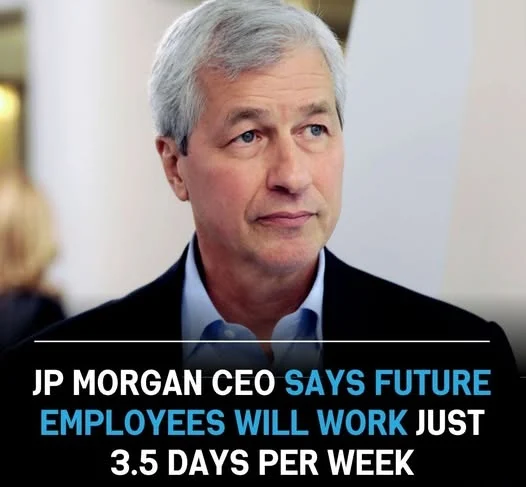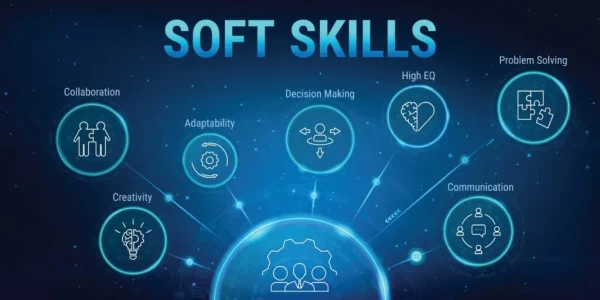In a rapidly changing world, the advancement of technology, especially artificial intelligence (AI), is gradually reshaping the way we work and live. CEO of JPMorgan, Jamie Dimon, has offered an optimistic vision for the near future: one where people can work less, live longer, and enjoy life more. According to him, technology could help us work only 3.5 days a week and live to be 100 years old, thanks to incredible advancements in science and technology.
Technology, and particularly AI, is quickly transforming industries, with the potential to automate 60-70% of current jobs, according to a report from McKinsey. This could lead to a major shift in the way we work. Along with reduced working hours, workers will have more time for health care, learning, and self-development. A recent study in the UK also showed that reducing working hours could reduce stress, prevent burnout, and increase productivity.

However, every change comes with challenges. One of the biggest concerns is that AI could replace a significant portion of current jobs, leading to job losses and increasing social inequality. This raises an important question about the redistribution of work and resources in the new society, as AI takes over manual and repetitive tasks. Can we ensure that the benefits of technology are shared fairly, without leading to deep divisions in society?
“Technology is not the enemy, but if not well-managed, it could become a dangerous tool.” – Jamie Dimon, CEO of JPMorgan.
Meanwhile, McKinsey also offers a fairly optimistic prediction about the future of work: with the development of AI, we may be able to reduce working hours without affecting productivity. A report from the International Labour Organization (ILO) in 2022 suggested that adopting shorter work models could reduce stress for workers, thereby lowering health and illness-related costs.
((((((((((((((((()))))))))))))))))))
Illustration: Shorter work models could help reduce stress and increase productivity.
((((((((((((((((()))))))))))))))))))
However, this doesn’t mean we must live dependent on technology. While AI can do many tasks for us, creating a society where people can still live proactively, take care of the planet, and enjoy life is a significant goal we need to strive for. Redesigning society is not just about technology, but also about how we organize our daily lives: spending more time with family, community, and self-care.
One potential direction is to promote the development of soft skills and human creativity, elements that technology struggles to replace. This will not only help us maintain our positions in the future economy but also contribute to creating a more sustainable society, where people can live in harmony with nature and enjoy the progress of technology.

Thus, our future lies not only in the hands of technology but also in how we reshape society to adapt to these changes. AI could be a powerful tool to improve productivity and extend lifespan, but we must manage it carefully, so technology becomes a part of life, rather than controlling it completely.


HPX24h > Science > Work 3.5 Days a Week and Live to 100: This Could Be Your Future
Tagged Articles
AI Can Simulate Evolution and Create Proteins – A New Opportunity for Breakthrough Medical Therapies
AI Can Make Life Easier, But Is It Harming Your Ability to Think Critically?
Top Reads from This Category
Science
Direct Brain-to-Brain Communication via the Internet
Science
China’s Hypersonic Jumbo Jet Could Cut Beijing to New York Flight Time to Just 2 Hours
Science
Innate Intelligence: What Role Do Genetics Play in Developing High IQ
Science
The Science of Measuring Biological Age: New Discoveries About the Aging Process
Science
Regrowing Adult Teeth in Just 9 Weeks: Science Turns the Impossible into Reality
Science
Science Uncovers the Brain’s Process of Storing New Ideas
Science
Why Do Adult Brains Continue to Generate New Neurons?
Discover New Topics
Fitness
Walking or Running: Which Is Better for Health and Weight Loss?
Science
Stem Cell Liver Regeneration: A New Solution for Patients with Severe Liver Failure
Parenting Tips
How to Talk to Children About Alcohol (Ages 6-8)
Health
The Link Between Daytime Sleep and Alzheimer’s Disease: What You Need to Know
Healthy Eating
The Benefits and Risks of the Keto Diet: Is It Really Good for Your Health?
Healthy Eating
Vegan Keto Diet: Everything You Need To Know
Science
Work 3.5 Days a Week and Live to 100: This Could Be Your Future
Healthy Eating
Robert F. Kennedy Jr.: “We Are Being Poisoned Without Knowing It”
Science
AI Can Simulate Evolution and Create Proteins – A New Opportunity for Breakthrough Medical Therapies
Healthy Eating
Health is ‘Declining’ Due to Processed Foods: How to Turn the Tide
Parenting Tips
Sleep Apnea in Preschoolers: Understanding It to Protect Your Child’s Health
Parenting Tips
Fun Facts for 3-Year-Olds: Exploring the World of Animals and New Foods
Health
5 Tips to Help You Overcome Smartphone Addiction